Joyce Byers: He’s a sensitive kid. Lonnie used to say he was queer. Called him a fag.
Jim Hopper: Is he?
Joyce: He’s missing, is what he is!
Judith Butler: Crafting a sexual position…always involves becoming haunted by what’s excluded. And the more rigid the position, the greater the ghost, and the more threatening it is in some way
Eleven: The gate, I opened it. I’m the monster
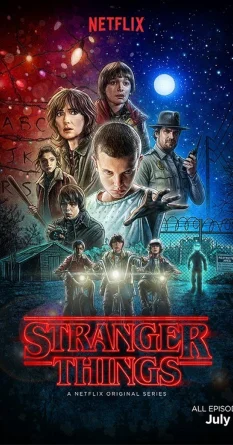
It’s almost too good
*SPOILERS (OBVS)*
I watched Stranger Things this week, yes, five months late to the party (just in time for Christmas so I can be creeped out by the lights). I could list a bunch of excuses, but really I just generally avoid anything that has a whiff of scary. But the thing about the horror/supernatural/sci fi genre is that it tends to engage with questions of the strange, the bodily and the abject, and is therefore inescapably relevant to queer theory and feminism. So, when I found myself in that inevitable position of why can I find literally nothing to watch on Netflix?, I gave in (and boy am I glad I did), because it turns out that Stranger Things is the gayest, campest, queerest, most feminist thing out at the moment—perhaps even in spite of its own intentions.
The troubling thing about watching shows later than everyone else is that you’ve missed the cultural discussion. So when I started feverishly googling “queer Stranger Things” and “feminist Stranger Things” after the series ended, I was surprised at arguments that worked hard to demonstrate how the show is anti-feminist, or like, stop making it about feminism already, and how people are stuck on questioning whether Will is gay or not. I was also intrigued by how everyone was obsessed with Barb and the grand injustice of it all. To me, all of these things entirely miss the richness of insight that the show has to offer on questions of gender and sexuality.
*****

Oppression, comin’ atcha
Let’s get to the feminist themes of the show first. It’s not feminist because it overtly trumpets “political, social and economic equality with men” (it doesn’t), but rather, it engages a feminist lens that magnifies sexism in all its forms and portrays female and genderqueer characters who resist in spite of the oppression that’s bearing down on them from all angles (literally).
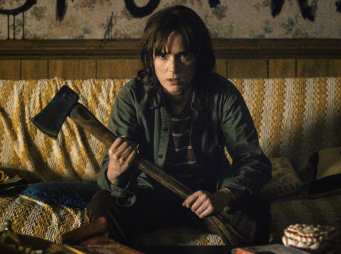
Joyce, holding her ground
That Joyce communicates with Will via lights isn’t just for special effect—it’s a comment on the gaslighting that many women experience in their everyday lives. Gaslighting is when someone is led to believe that they are misperceiving things, and that they are crazy/losing their mind. The term originates from a 1930s play where a man tricks his wife into thinking she’s going mad, which involves him messing with the gas lamps in the house. Many women experience gaslighting as a subtle form of emotional abuse in intimate relationships. Joyce is told by all the men around her (the police, her oldest son, her ex-husband) that she’s crazy and that she’s mis-perceiving (so crazy in fact that she can’t even recognise the body of her own son), YET she persists in her rescue mission. The ultimate lesson is: believe in yourself and grab a f***ing axe while you’re at it.
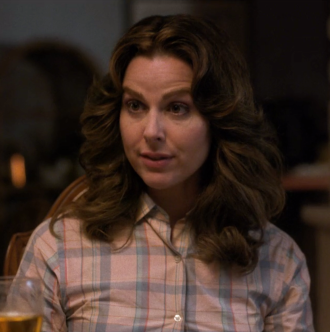
Karen Wheeler (note checked shirt for later)
The show also did a kick-ass job at celebrating mothers as at once loving and fierce. For one, there’s Karen Wheeler, Mike and Nancy’s mother, who is constantly reminding her children: I’m here if you need me. And we might wonder, where the hell is the dad most of the time? Their mother is the centre of it all, she’s the one doing the emotional labour. Joyce repeats a similar mantra of support to both Will in the Upside Down, and Eleven when she’s in the sensory deprivation tank: I’m here for you. Of course we could read this as stereotyping motherhood, but in a world where mothers are so frequently represented along a binary of either strong and evil, or caring but passive, I think it’s a celebration of strength in vulnerability. Unlike the mothers of the original 1980s slasher flicks, these women are to be revered, not feared. The lesson is: celebrate the mothers, they’re the ones keeping sh*t together.

The patriarchy involves women leaders too
Fathers get a rather different wrap in the show, but the complexity of masculinity is also engaged with rather than made one-dimensional. Perhaps the most notable father is Eleven’s “papa” Dr Martin Brenner, who dare I say represents the patriarchy, that is, the “rule of the father”. This character also demonstrates the long history of science and medicine ruling over bodies, particularly female or genderqueer ones. For instance, he tells Eleven that they are “sick” and that he will make them “better”—a reflection of the disciplining of non-conforming bodies that has long been documented (thanks Foucault). There is also the absent father /deadbeat dad (Lonnie), who functions to show us the abuse that occurs in the family home and the perils of single motherhood. And then there is Jim Hopper, the dad who has lost his daughter. With this storyline we are made privy to the vulnerable side of masculinity, and the very few options for expressing these kinds of emotions that men are offered in life. For Jim, his sadness hardness into detached coolness. Similarly, for Jonathan Beyers—who reveals crying after being forced by his father to kill a rabbit as a child, to “make him a man”—his vulnerability hardens into stalkerish reclusiveness. The lesson is: the rule of the father (or whatever you want to call it—patriarchy, gender expectations, etc) is bad for everyone.
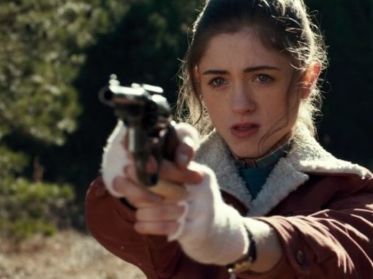
How good is Nancy?! (Note checked shirt underneath)
You know what else is bad for everyone? Slut-shaming. Nancy experiences some pretty heavy slut-shaming not only from her friends at school, but from the police. While Nancy is all, Barb is missing! the cops are all, but did you have SEX? Nancy realises that justice isn’t going to be served through the formal legal channels, and that she’s going to have to take things into her own hands if she wants to get things done. She’ll pick up a gun, say “screw that” to the nuclear family, and unthinkably crawl through goo in a tree in order to rescue her friend. Unlike many rescue stories, the hero here is a woman. When it turns out that the monster has killed her friend, Nancy doesn’t give up, she grows in her resolve. Indeed, after this she’s out for revenge, but the female-rescuing-female trope subverts the normal “revenge” paradigm that usually focuses on rape. You know who cared about Barb in a world that just generally didn’t? Nancy did. That was the entire driver for Nancy, her friend. The lesson is: sh*t, Nancy is awesome.
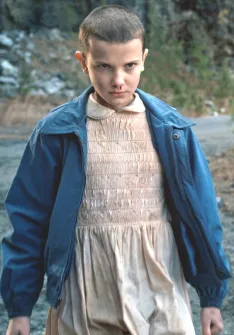
Eleven not even messing around one bit
Last but not least on the question of gender, Stranger Things engages with the gender conformity that is thrust upon us in a world of heterosexuality. In order to “pass”, Mike and his friends dress Eleven up in pink, a blonde wig, and makeup. Mike is rather happy about Eleven’s new “pretty”, but Eleven’s not so sure. When Eleven is accused of being too aggressive and too crazy (after hurting Lucas), they cast their wig off and strides into the supermarket to take whatever they like, slamming doors along the way. They’re saying, you don’t own me, you can’t control me. While Joyce teaches us that you can be a mother and a fighter, and Nancy teaches us that you can be feminine and a hero, Eleven shows us that femininity can be restricting and awful when it is thrust upon us.The lesson is: you can be queer in your gender expression and save the world.
*****
This last point brings me to my queer reading of the series. Again, this isn’t to say that the show is queer because there are a bunch of LGBTQ characters in it (this is debated), but rather, we can undertake a queer reading that reveals the show’s underlying themes related to subverting the normal when it comes to gender and sexuality.
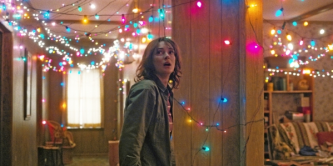
A camp extravaganza
First, the obvious things. The overabundance of christmas lights is super camp. Camp refers to a sensibility seen as linked with homosexuality, a focus on the over-the-top, and the rejection of middle-class taste. Camp is also often associated with Christmas, with its gaudy decorations and glitz and glam. Joyce goes totally OTT with the Christmas lights, and the same time that she’s tearing down the walls of the family home. It’s no wonder that when Lonnie comes home he tries to force “normal” family life by literally patching things up and taking the lights down. But Joyce won’t have it. The Beyers residence is a camp wonderland that does family life differently.

Misfits abound in Stranger Things
Second, the title Stranger Things, refers to the strange that is so central to queer readings. Queer theory focuses on “queering” the normal, and has often been about celebrating that which is considered “strange”. In the show, all of the heroes are “strange” in some way, they are misfits who reject how things are “supposed to be done”.

Will (in yet another checked shirt)
Very importantly, there is an overt emphasis on Will’s presumed gayness, with references made to his “queerness” almost every time he comes up in conversation. Whether his character is gay or not is really besides the point, because there is another story bubbling under the surface here (which this article from the Advocate basically hints at—but it’s much more literal than they suggest). When the school bully asserts that Will is “in fairyland now right”, we should take note. If we read this claim in conjunction with Judith Butler’s claim that we are always “haunted” by those sexual subject positions we exclude, we can understand the Upside Down as also implicitly referring to “inversion“, the old way that sexologists in the 19th century used to describe homosexuality. This isn’t to say that the Upside Down is a world of homosexuality, but rather, that it is the shadow world that the bigots project as the opposite normality.

Mouth breather
It’s also a world that casts queer bodies into what Butler would call the “ungrievable“—where some people’s sexuality and gender cannot be understood to the point that their lives cannot even be mourned in death. That the “real” Will is illegible (he is a shadow, and his “body” is a fake) , that almost no one cares about Barb going missing, that there is barely a blink that several people have disappeared in a matter of days…It all testifies to understanding the Upside Down as that which is cast out of the world, that is not allowed to exist in “normal” life. But what can move between worlds, and what can be identified by those who are critical of normality, is the monster, i.e. homophobia. Here, the monster is the ultimate “mouth breather” (its face is all mouth after all), it is THE bully, the homophobe.
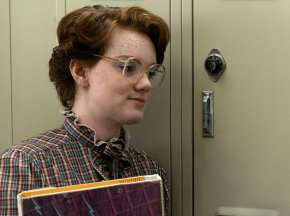
Barb, another outsider (and checked shirt wearer)
Along these lines we can also note that unlike the old horror movies of yore, it is not the youngsters engaged in hetero sex who get taken by the monster…Barb gets taken specifically because she doesn’t want to engage in that milieu. Who else gets taken? As the police briefly discuss, two men who went out “hunting” that week but their utter lack of concern about this makes us think maybe there’s some subtle homophobia going on there, like, well, we know what goes down in those woods…
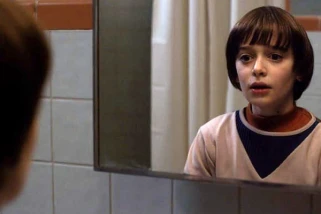
Perhaps Will is reflecting on his internalised homophobia
It is also not surprising that the monster is unleashed in the processes of spying on Russians—as many have documented, fear of communism was often promoted through connecting “commies” to “homos”. As George Chauncey notes, “The spectre of the invisible homosexual, like that of the invisible communist, haunted Cold War America”, which manifested in the USA as the Lavender Scare during the 1950s. In their spying on the Russians, Eleven predictably also spies homophobia. Of course, Eleven gets blamed for unleashing havoc, buying into the notion that it is them who is monstrous, rather than homophobia that is the destructor. We see this play out in life all of the time—when conservative politicians argue that that it is really gender and sexual non-conformity that is the real concern (think of the children!) rather than the bullying and hate-crimes that are committed against those who don’t fit the “normal”. Notably, the monster in Stranger Things forces ingestion on its prey as a way to reproduce, that is, it creates internalised homophobia. By the end Will is literally vomiting up this monstrous self-hatred, and the family home is neatly (too neatly) patched up back to normalcy.
That the monster is attracted by “blood” also calls to mind the AIDS crisis that emerged in the 1980s, and that was a central subtextual theme of many of the horror films that Stranger Things references. At the time AIDS was first called “Gay Related Immune Deficiency” or GRID, and again, it was homosexuals who were seen to be the source of death, rather than the victims of homophobic governments who were slow to act on the emerging health crisis.
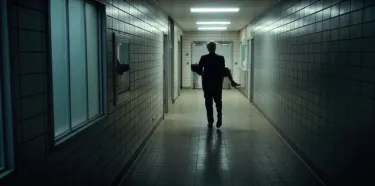
The lab, lined by grids
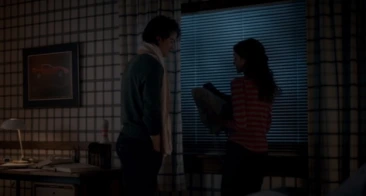
Steve’s room, so many grids
Interestingly, Stranger Things is dominated by grids. The corridors of the Hawkins National Laboratory that holds the doorway to the Upside Down depict a grid that is also mirrored in Steve Harrington’s bedroom decor (that we see just before Barb is taken). Many of the characters also wear plaid/checked i.e. grid patterns. In fact, the world of Stranger Things is literally littered with grids. The double meaning of this grid obsession is also the “grid of cultural intelligibility” that Butler discusses—the norms of sexuality and gender that constitute the fabric of the social world. Going to the Upside Down means falling off this grid, where you can be the prey of homophobia without cultural recognition.
The lesson of all of this is a reminder that the monster of homophobia needs to be fought, not internalised, in order to keep everyone safe from falling off the grid.
*****

Stranger Things questions, rather than merely replicates, the dominant paradigm
All of this is not to say that the Duffer Brothers have been reading Judith Butler (though, it’s not that unlikely) or any other queer theory or feminist texts for that matter. Rather, we can see these elements of Stranger Things as testament to the zeitgeist permeating the popular subconscious from the 1980s to today, that involves a mash of ideas about gender, sexism, sexuality, and homophobia. The show manages to tap into these issues and depict the realities of oppression, all the while making its non-conforming characters the heroes. This is really what makes this show stand out in a field of popular representations: it does more than reproduce normative ideas, it offers a challenge to them.

Pingback: 2016 Year in Review — The 16 of Trumps (and Journalism) — #15 in Films, TV, Albums, Books | completepatrick
I am picking up what you are putting down. I ADORED this show for reasons mostly to do with Stephens King and Spielberg, and the loving homage to 80s classics I loved.
I had thought a lot about the portrayal of women and it’s feminist sensibility and I agree with what you have laid out in your post. There’s a few scenes with Karen’s husband, where it’s clear that though he’s not a deadbeat dad, he’s not present and does none of the emotional labour of the family — he’s both woefully out of touch and sadly missing out on his awesome family. It reminded me a lot of a scene in True Detective S1 where Woody Harrelson’s character obliviously alienates his wife and daughters over the course of 5 minutes with his boorishness. That partriarchal behavior in both shows is clearly portrayed as damaging and toxic, for both the family and the father.
I loved that Steve gets a chance to redeem himself from the slut-shaming and he takes it and is genuinely remorseful and contrite – when does that ever happen in TV?
I also loved that when Jim Hopper came around to believing Joyce, after doing his job, he and Joyce and the kids all work together as a team, playing their individual roles to defeat the Demagorgon and the shadowy agency behind it. In all the best teen supernatural shows I have watched and loved – Buffy, Teen Wolf, Vampire Diaries – are always better when the adults and children let one another in on the secret (vampires, werewolves) and work together to defeat the Big Bad.
I don’t naturally read/see things through a queer lens, so I’ve loved reading your take on this aspect. I’ll be really interested to see where they take Eleven in S2, and how far they stray from what they’ve set up.